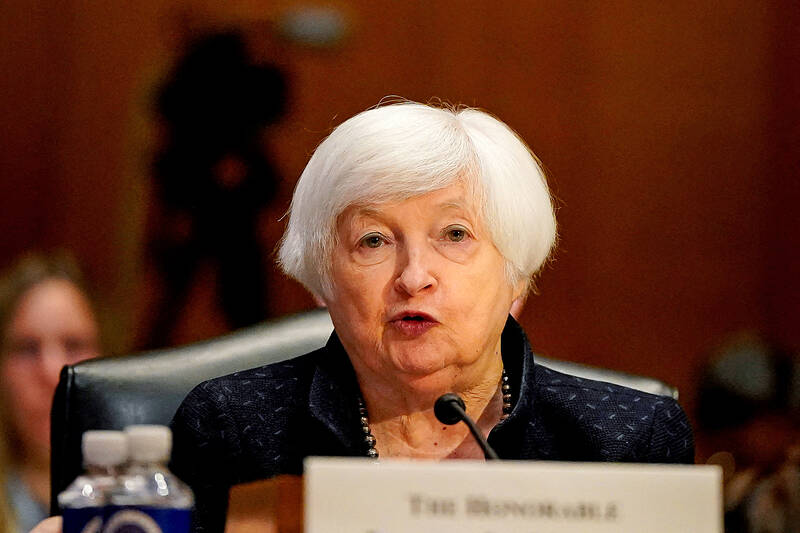US Secretary of Treasury Janet Yellen is calling out China’s ramped-up production in solar energy, electric vehicles and lithium-ion batteries, calling it unfair competition that “distorts global prices” and “hurts American firms and workers, as well as firms and workers around the world.”
Yellen, who is planning her second trip to China as Treasury secretary, said in remarks prepared for delivery yesterday in Georgia that she would convey her belief that Beijing’s increased production of green energy also poses risks “to productivity and growth in the Chinese economy.”
“I will press my Chinese counterparts to take necessary steps to address this issue.”

Photo: Reuters
China is the dominant player in batteries for electric vehicles and has a rapidly expanding auto industry that could challenge the world’s established carmakers as it goes global. The International Energy Agency, a Paris-based intergovernmental group, notes that China accounted for around 60 percent of global electric car sales last year.
Yellen’s remarks were to be delivered yesterday afternoon at Suniva Inc — a solar cell manufacturing facility in Norcross, Georgia. The plant closed in 2017 in large part due to cheap imports flooding the market, according to Treasury. It is reopening, in part, because of incentives provided by the Democrats’ Inflation Reduction Act, which provides tax incentives for green energy manufacturing.
The firm’s history is something of a warning on the impact of oversaturation of markets by Chinese products — and a marker of the state of US-China economic relations, which are strained due to investment prohibitions and espionage concerns, among other issues.
China on Tuesday filed a WTO complaint against the US over what it says are discriminatory requirements for electric vehicle subsidies. The Chinese Ministry of Commerce didn’t say what prompted the move.
The European Union, also concerned about the potential threat to its auto industry, launched its own investigation into Chinese subsidies for electric vehicles last year.
“In the past, in industries like steel and aluminum, Chinese government support led to substantial overinvestment and excess capacity that Chinese firms looked to export abroad at depressed prices,” Yellen said. “This maintained production and employment in China but forced industry in the rest of the world to contract.”
“These are concerns that I increasingly hear from government counterparts in industrialized countries and emerging markets, as well as from the business community globally,” she said.
The tone of Yellen’s speech stands in contrast to Chinese President Xi Jinping (習近平), who met with American business leaders in Beijing yesterday and called for closer trade ties with the US amid a steady improvement in relations that had sunk to the lowest level in years.
Xi emphasized the mutually beneficial economic ties between the world’s two largest economies, despite heavy US tariffs on Chinese imports and Washington’s accusations of undue Chinese Communist Party influence, unfair trade barriers and theft of intellectual property.

Among the rows of vibrators, rubber torsos and leather harnesses at a Chinese sex toys exhibition in Shanghai this weekend, the beginnings of an artificial intelligence (AI)-driven shift in the industry quietly pulsed. China manufactures about 70 percent of the world’s sex toys, most of it the “hardware” on display at the fair — whether that be technicolor tentacled dildos or hyper-realistic personalized silicone dolls. Yet smart toys have been rising in popularity for some time. Many major European and US brands already offer tech-enhanced products that can enable long-distance love, monitor well-being and even bring people one step closer to

MAJOR BENEFICIARY: The company benefits from TSMC’s advanced packaging scarcity, given robust demand for Nvidia AI chips, analysts said ASE Technology Holding Co (ASE, 日月光投控), the world’s biggest chip packaging and testing service provider, yesterday said it is raising its equipment capital expenditure budget by 10 percent this year to expand leading-edge and advanced packing and testing capacity amid strong artificial intelligence (AI) and high-performance computing chip demand. This is on top of the 40 to 50 percent annual increase in its capital spending budget to more than the US$1.7 billion to announced in February. About half of the equipment capital expenditure would be spent on leading-edge and advanced packaging and testing technology, the company said. ASE is considered by analysts

TRANSFORMATION: Taiwan is now home to the largest Google hardware research and development center outside of the US, thanks to the nation’s economic policies President Tsai Ing-wen (蔡英文) yesterday attended an event marking the opening of Google’s second hardware research and development (R&D) office in Taiwan, which was held at New Taipei City’s Banciao District (板橋). This signals Taiwan’s transformation into the world’s largest Google hardware research and development center outside of the US, validating the nation’s economic policy in the past eight years, she said. The “five plus two” innovative industries policy, “six core strategic industries” initiative and infrastructure projects have grown the national industry and established resilient supply chains that withstood the COVID-19 pandemic, Tsai said. Taiwan has improved investment conditions of the domestic economy

Malaysia’s leader yesterday announced plans to build a massive semiconductor design park, aiming to boost the Southeast Asian nation’s role in the global chip industry. A prominent player in the semiconductor industry for decades, Malaysia accounts for an estimated 13 percent of global back-end manufacturing, according to German tech giant Bosch. Now it wants to go beyond production and emerge as a chip design powerhouse too, Malaysian Prime Minister Anwar Ibrahim said. “I am pleased to announce the largest IC (integrated circuit) Design Park in Southeast Asia, that will house world-class anchor tenants and collaborate with global companies such as Arm [Holdings PLC],”